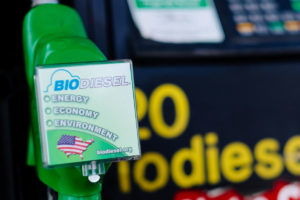 A decade of work by the National Biodiesel Board (NBB) has finally paid off as California has cleared the way for storing biodiesel blends of up to 20 percent (B20) in underground storage tanks, removing the last major barrier to mainstream use in the state.
A decade of work by the National Biodiesel Board (NBB) has finally paid off as California has cleared the way for storing biodiesel blends of up to 20 percent (B20) in underground storage tanks, removing the last major barrier to mainstream use in the state.
NBB worked with several member companies and the California Advanced Biofuels Alliance to provide the State Water Board with data necessary to demonstrate B20 compatibility in underground storage tanks.
Biodiesel, a renewable fuel for diesel engines, significantly reduces greenhouse gases compared to fossil fuels. This makes biodiesel use an important strategy in meeting the state’s Low Carbon Fuel Standard. The California Air Resources Board affirms biodiesel reduces greenhouse gases by at least 50 percent, and often by as much as 81 percent compared to petroleum. This gives biodiesel some of the best carbon scores among all liquid fuels.
The vast majority of diesel fuel is stored in underground storage tanks, particularly at retail fueling locations. Although biodiesel biodegrades in water as fast as sugar, regulators had concerns that any degradation of UST materials could allow diesel fuel to compromise the water supply.
The California State Water Resources Control Board amended California Underground Storage Tank (UST) Regulations on August 6. The regulations now say that diesel containing up to B20, meeting the ASTM standard for B20 (D7467), “shall be recognized as equivalent to diesel for the purpose of complying with existing approval requirements for double-walled USTs, unless any material or component of the UST system has been determined to not be compatible with B20.”
The language reverses the previous wording of the regulation, which in effect required tank owners to prove that every component of the tank was compatible.

